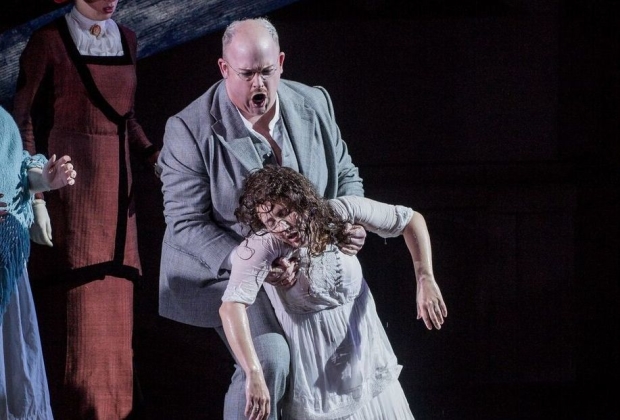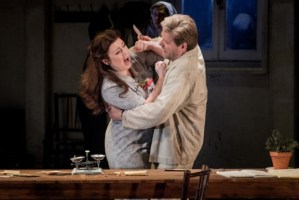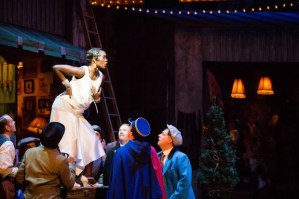Review: Kát'a Kabanova (Opera Holland Park)
Moody, magnificent and terrible, OHP’s 2009 production of Janáček’s opera returns.

© Robert Workman
The measure of a great night is less what you see and hear than what you take away from it. And Opera Holland Park‘s revival of its 2009 Kát’a Kabanova freighted my brain with so much baggage I could barely stagger to the Underground.
The show is not perfect. One of the principals had difficulty projecting over Janáček’s opulent orchestrations; the ultra-wide Holland Park stage will have compromised the sound balance for most audience members at some point or other; Olivia Fuchs‘s direction dips from the literal to the expressionistic and back again in ways that do not always convince.
Yet taken as a whole it’s heaven on a plate. Janáček’s adaptation of Ostrovsky’s The Storm – the harrowing tale of a morally unimpeachable young woman, wretchedly married but in love with another man and destroyed by the schism of her own adultery – invests a classic operatic subject with shattering psychological insights. Kát’a Kabanova is bleak, hopeless, human and all too recognisable.
Fuchs has long struck me as a director who’s stronger with character than with concept, and her second stab at this opera brims with lived-in human beings. She has re-directed the opera from scratch, albeit on the original evocative sets by Yannis Thavoris, a move that has allowed her to weave anew the fine gold thread that links players to their characters. Thus from the first appearance of Paul Curievici as Kudrjaš we see life churning behind his eyes, and so it is with everyone else in this deeply considered production. Anne Mason as Kát’a’s mother-in-law, Kabanicha, may have been a notch underpowered (yes, it was she) but as an actress her hectoring presence recalled Wendy Hiller in her pomp.
'Janáček’s most richly coloured and disturbingly flavoured score'
This is the second luminously sung Janáček opera of the summer, and two leading British tenors have graced both of them. Peter Hoare, who was Laca in last month’s Jenůfa for Grange Park Opera, here sings the adoring Boris, while Nicky Spence exchanges that opera’s feckless Števa for Kát’a‘s maternally emasculated cuckold, Tichon. They both bring psychological depth and danger – not to mention grand operatic voices – to trouble the audience’s experience. Spence in particular, despite being confined to working in two dimensions (stage left to stage right) shows us exactly why his wife is so unfulfilled by their marriage.
While the tenors lend distinction to the production, it’s soprano Julia Sporsén who takes us with her into the vortex of Kát’a’s personal hell. Trapped in a life of abuse at the hands of her husband and stepmother, the love and consolation of her life now lost to her, this emotionally naked singer – who showed in ENO’s Duchess of Malfi and Giulietta the extent of her dramatic range and courage – draws us in to share the harrowed woman’s fate. It is a searing performance.
Meanwhile, the untroubled romance between Curievici’s Kudrjaš and Clare Presland as the devoted Varvara offers a telling counterpoint to the furtive, guilt-plagued fumblings of Kát’a and Boris. Here, they seem to say, is what love ought to be. Add the impressive darkness of Mikhail Svetlov as Boris’s bullying uncle, Dikój and a beautifully shaded cameo by Ross Ramgobin as Kudrjás’ friend Kuligin, and the opera is blest.
The belting City of London Sinfonia assails the ear with immaculately dosed helpings of romance and horror; and together with the OHP Chorus, whose members personify Kát’a’s paranoia in movement director Clare Whistler‘s mime work, they respond rousingly to Sian Edwards‘s rhapsodic conducting of what, to these ears, is Janáček’s most richly coloured and disturbingly flavoured score.
In this madly overstuffed summer of opera everyone will have had their favourite. This is mine.














